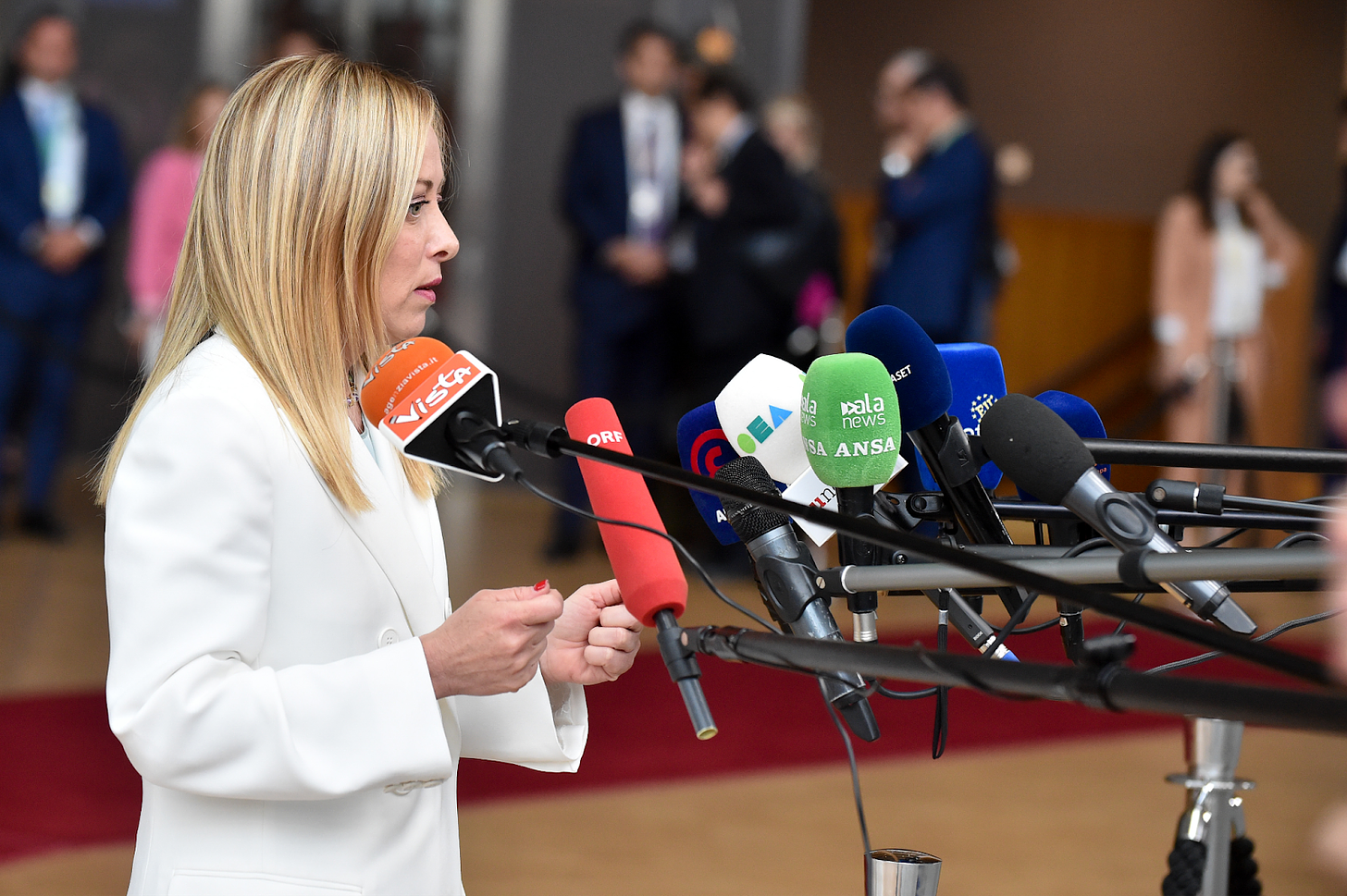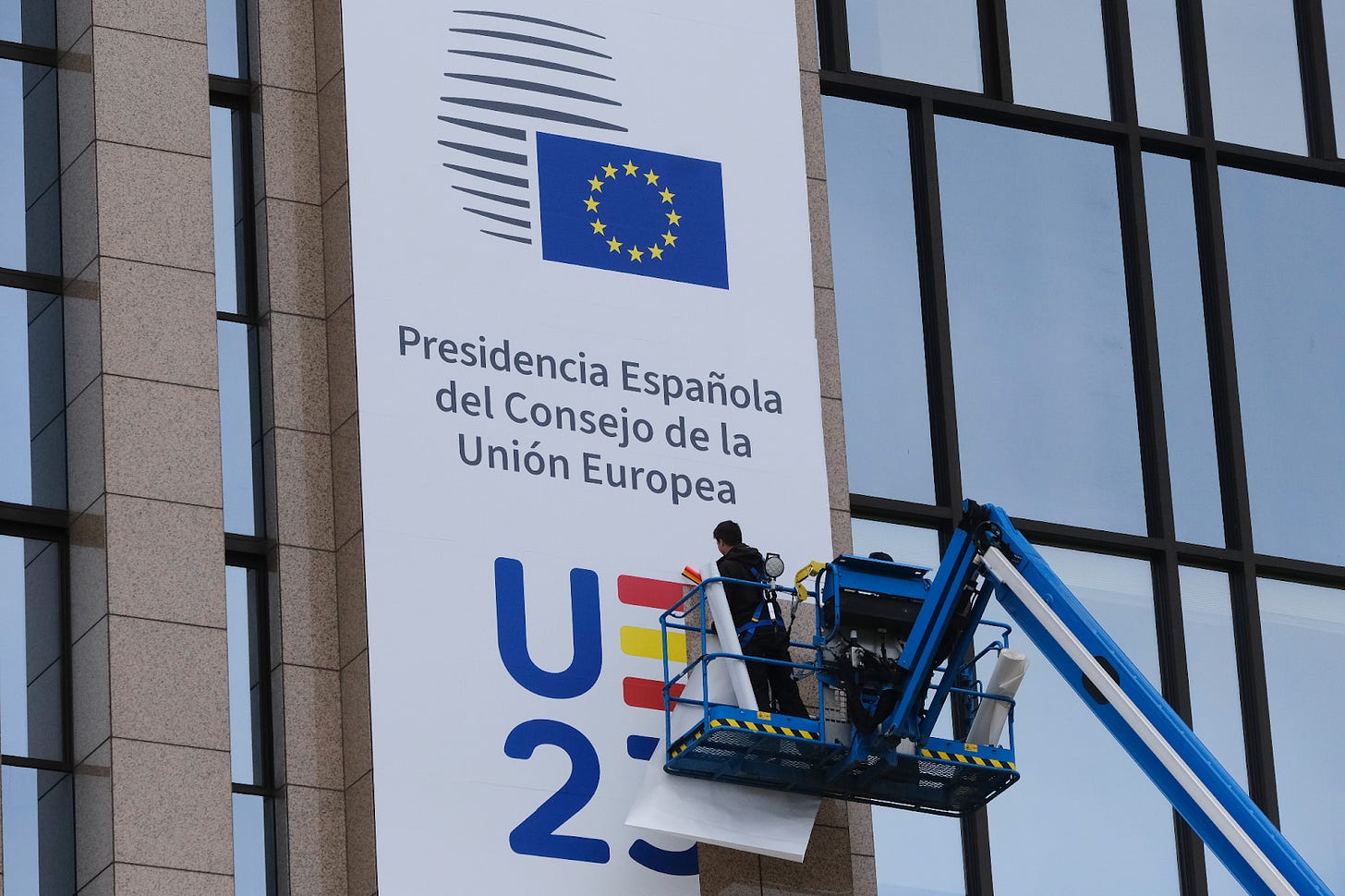Hi! This is Monday, 3rd July 2023, and here’s the EU news you need this week. Feel free to share this newsletter with friends and colleagues, and follow us on Twitter and Linkedin.
The Briefing
The European Council that took place on 29 and 30 June was marked by intense discussions on the EU's migration policy. Poland and Hungary voiced their dissatisfaction with the reform of asylum procedures and migration management: on these issues, Member States were unable to find a common voice — migration policy now seems to have taken a permanent seat at the Council.
CONCLUSIONS • Despite being the topic of much debate during last week’s Council, migration policy was largely absent from the conclusions of the meeting. Despite more than seven hours of discussions, Poland and Hungary blocked the adoption of joint conclusions on the subject.
The two countries took advantage of the Council to voice their criticism of the agreement reached on 8 June by the European interior ministers on a major reform of European migration policy.
CONTEXT • Since the 2015 migration crisis, the EU has repeatedly tried to reform its rules on asylum application procedures and the relocation of migrants, without achieving any real result.
At the beginning of June, however, interior ministers reached a so-called historic agreement aimed at reforming a large part of these rules. "I wasn't sure this day would come," then commented Maria Malmer Stenergard, Sweden's Minister for Migration.
This agreement seeks to satisfy both the border Member States that want more support to manage influxes of migrants and those that consider that the number of migrants arriving and moving illegally within the EU is too high.
The agreement envisions two different procedures for asylum seekers. The border procedure, which is intended to be stricter, would be reserved for migrants with little chance of being granted asylum. Another, less strict, procedure would apply to migrants who are more likely to be granted asylum.
With regard to the distribution of migrants between Member States, the agreement finds common ground between countries such as Italy — which has long wanted compulsory relocation of migrants across Member States — and Hungary and Poland — which are still firmly opposed to this.
Thus, while the objective is to relocate at least 30,000 migrants per year, Member States that wish to refuse to receive migrants can do so by paying 20,000 euros for each migrant not welcomed. This money will be used to fund projects, the nature of which has not yet been defined.
OPPOSITION • This agreement — which constitutes the Council's negotiating position on the package proposed by the Commission — was reached by a qualified majority, meaning that 55% of Member States representing at least 65% of the total EU population voted in favour.
Unsurprisingly, Hungary and Poland did not vote in favour of the text at the beginning of June. Both Member States expressed their dissatisfaction at the last European Council.
"The problem today was not the immigration pact, but the fact that Hungary and Poland did not like the way it was decided (...). They are so unhappy about it that they don't want any conclusions on immigration", said Dutch Prime Minister Mark Rutte.
"The Poles and Hungarians as a block are saying that they do not recognise the validity of the agreement, they want to return to the logic of 2018 where decisions are taken by consensus," said a French diplomat, quoted by Euractiv.
Polish Prime Minister Mateusz Morawiecki believes that Poland should be exempt from the relocation measures, citing the high number of Ukrainians who have found refuge in the country.
Other Member States tried to put water in their wine by modifying the wording of the conclusions, envisaging in particular "new ways of progressing towards the objectives (...) including original thinking", which could, according to Politico, refer to the possibility of redirecting asylum seekers to third countries — although this was not mentioned explicitly.
Despite long negotiations, Hungary and Poland stuck to their guns and blocked the adoption of conclusions on the subject.
"End of the discussion: no support for the bad pact on migration. Fight hard against the pro-migration forces in Brussels", tweeted Balázs Orbán, adviser to the Hungarian Prime Minister.
ITALY • Despite last week’s impasse, it is interesting to note Italy's central role as mediator on the subject of migration. According to numerous sources, Giorgia Meloni played an important role in discussions with Poland and Hungary.
Italy was also one of nine Member States calling for a new partnership with Africa on energy and migration issues. An EU-Tunisia agreement to combat illegal crossings is already under way.
WHAT NEXT? • Despite opposition from Hungary and Poland, the agreement reached on 8 June by the Member States' home affairs ministers is perfectly legal, which means that the Council can now begin its negotiations with the Parliament — which has already adopted its position on the migration and asylum package.
Until then, migration is likely to remain a divisive issue during forthcoming European Councils.
In Case You Missed It
DSA • After much fuss between the EU and Twitter over the Digital Services Act (DSA), it was finally a German company that fired first. German e-commerce platform Zalando is challenging its designation by the European Commission as VLOP – very large online platform – before the European Court of Justice.
Zalando is the only European company among the 17 platforms designated by the Commission as VLOPs in April, alongside Twitter, AliExpress, Google Maps and TikTok. Zalando disputes the methodology used by the Commission to calculate the number of monthly users — the designation is triggered when companies have more than 45 million monthly active users.
The DSA imposes additional obligations on these systemic platforms in the fight against disinformation. It now remains to be seen if Big Tech will join the fight and challenge their designation decisions.
STEEL WAR • The European Union has rejected the United States' proposal to eliminate tariffs on steel and aluminium, reviving fears of a return to trade tensions.
The EU believes that the US proposal would violate World Trade Organisation rules by favouring domestic producers. If a truce currently suspends the tariff war initiated by Donald Trump in 2021, the two partners have until October to reach an agreement on the creation of a new "green steel club" to avoid the automatic reinstatement of U.S. tariffs and retaliatory measures by the EU.
The U.S. proposal provides that this club would allow members to set emission standards and impose tariffs on those that do not comply. The EU prefers its Carbon Border Adjustment Mechanism (CBAM), which would impose tariffs on imports based on carbon intensity.
The EU proposes to combine CBAM and conventional trade defence tools to address overproduction and calls for a global agreement for sustainable steel and aluminium. With the October deadline approaching, EU Trade Commissioner Valdis Dombrovskis is heading to Washington this week to try to push the negotiations forward.
ECB • Inflation fell to 5.5% in June within the eurozone, after 6.1% in May, according to the latest Eurostat data. While energy contributes to this de-escalation, core inflation as measured by the consumer price index (CPI) continues to rise. The acceleration in the inflation rate driven by everyday consumer goods.
Stubbornly high core inflation is increasing pressure for the European Central Bank (ECB) to continue raising interest rates. At an ECB meeting in Sintra, in Portugal, Christine Lagarde called on her colleagues to continue rate hikes. The next ECB meeting is scheduled for July. The Frankfurt institution is due to announce an increase of 25 basis points, i.e. +0.25%.
DATA ACT • On 27 June, the Council of the EU and the European Parliament reached a provisional agreement on the Data Act, which aims to regulate Internet of Things data.
The agreement reached between the Council and Parliament draws lessons from the Covid-19 pandemic by establishing a right for public bodies to access individuals' data in situations of crisis or public emergency. It also provides rules against illegal data transfers.
Faced with the fears expressed by some digital players about the impact of the Data Act on commercial secrecy, the agreement establishes a strict framework for this kind of data, in particular by providing for the possibility of an "emergency pause" when the operator risks "serious and irreparable economic losses".
The agreement still needs to be formally approved by the co-legislators, and will become applicable 20 months after its publication in the Official Journal.
This week’s photograph
What we’ve been reading
Sander Tordoir of the CER argues that Germany needs to find a new growth model.
For Bruegel, Alexander Lehmann reviews the Commission’s proposals for reforming access to capital markets, which he welcomes but deems insufficient to have a transformative impact.
This week’s newsletter is brought to you by Luna Ricci, Augustin Bourleaud and Maxence de La Rochère. See you next Monday!




